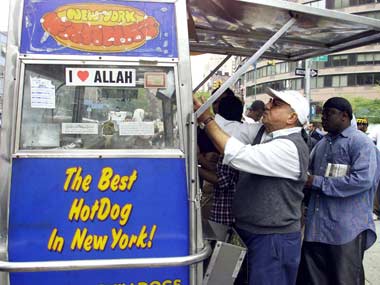He was my next-seat companion at 36,000 feet altitude on the 15-hour-long flight from Abu Dhabi to Chicago. He did not wish to reveal his name or want his photograph taken. I told him I would call him ‘Khan’. “It is the most famous Muslim surname in India,’’ I said. He said he wouldn’t know, he did not watch Bollywood films. I wanted to tell him maybe that’s why ‘Dhoom 3’ with Aamir Khan is being shot in Chicago, but I let that pass… ‘Khan’ is 25 years old and an American citizen. His father came to Chicago in the late 70s to pursue his import-export business and Khan and his four brothers are American citizens by birth. Khan’s father was born in Patna in Bihar, but all their relatives now live in Karachi. Khan himself married a girl from Karachi last year. She too is on the flight back home with him, after a visit to her native home in Pakistan. Khan teaches classical aerobics in Chicago. He is also trained at the Institute of Islamic Education in Elgin, Illinois. Khan’s looks are a giveaway to his religious identity. A flowing beard and a cap complete the picture of anyone, he says, who wants to stereotype him. Likewise with his wife, behind a veil. [caption id=“attachment_512046” align=“alignright” width=“380”]  Muslims in the US feel left out of this US presidential elections, but hold the key in some battleground states. Reuters[/caption] “You a Democrat or a Republican supporter?’’ I ask him. He says he voted for Barack Obama in 2008, but does not feel the same for him anymore. “He made a lot of promises but fulfilled just about, say, 25 per cent of them. He started off being a people’s person, but does not seem to be anymore. Perhaps I may not even vote this time. Because I am tired of all the lies. Whoever becomes President isn’t going to improve my life. If any American Muslim thinks his life will get better because Obama or anyone else is President, then he is only kidding himself.’’ The feeling of being let down, perhaps by the weight of his own expectations from President Obama, is obvious. Khan questions Obama’s record on fixing poverty and more. “He said he will finish off the two wars, shut down Guantanamo Bay. Nothing delivered. Yes, a whole lot of minorities and black Americans did vote for Obama because he seems more approachable, but look at the statistics of how blacks are treated in this country. They get less education, less welfare, less of everything.’’ Khan’s life, like many others of his community in Chicago and elsewhere, is divided into pre- and post-9/11 periods. He says he was in middle school then, called a terrorist by another boy - who got punched by Khan for the misdemeanor. Since then, many ‘Khans’ and their family members have lived the life of being labelled and abused. Has Obama’s presidency made you feel secure in America as a Muslim, I ask. “I do not depend on Obama to feel secure. He was not walking with me, every time I got pulled over by the policeman because of the colour of my skin or my looks. Having him as President does not prevent taunts of the abusive kind directed at me in public places. I have been called a terrorist and told ‘Go back to your country, you Pakistani’. But hey, this is my country. Even a couple of months ago, at a basketball game, our rivals called me Sand Nigers, an abusive term for Arabs,’’ Khan says. Khan’s tone is rising and a couple of other passengers, I can sense, are eavesdropping on the conversation. Khan’s anger and frustration also stem from the fact that none of what he articulates is part of the discourse at election time. The 2.6 million American Muslims (up from 1.5 million in 2001) constitute just 1 percent of the population; and so, neither party spend time and energy trying to woo them. The flip side, however, is that in crucial battleground states like Florida and Virginia, Muslims could have a say in a close contest. Like it happened in the George Bush-Al Gore contest in 2000 when Bush won the disputed poll by winning in Florida by just 500-odd votes. In that state, Bush secured 50,000 more votes from Muslims than Al Gore did. If Obama has not changed things for the better, why not give Mitt Romney a chance, I argue. “Nay. Romney’s views are too far-right. They make me uncomfortable. There is no point in having a booming economy if the country is socially corrupt. America is a socially corrupt country because of racial and religious discrimination. The rights of minority groups, immigrants are not honored. Only people who are white are considered American in the USA.’’ But despite all this, Khan is adamant he won’t change anything about himself. “I deliberately wear this attire and sport this look. I know I stand out in the crowd. I want people to come and engage with me so that I can confront those arguments.’’ I tell Khan the story of Shah Rukh Khan’s 2010 film My Name is Khan and the line ‘… and I am not a terrorist’. “Nay, that’s not the way to do things. Best not to confront the authorities. With that kind of phrase, by mocking them, you are only looking for trouble.’’ T S Sudhir is travelling in the US as part of an exclusive group of 25 journalists from 25 countries, to report on the Presidential Elections. The tour is organised by the Foreign Press Center, US Department of State
Muslims in the US feel ’left out’ in the mainstream political discourse, but in crucial battleground states like Florida and Virginia, their votes could influence the outcome in a close contest.
Advertisement
End of Article


)
)
)
)
)
)
)
)
)



